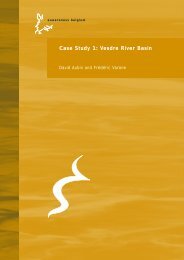Case Study 1: Matarraña River Basin - Euwareness
Case Study 1: Matarraña River Basin - Euwareness
Case Study 1: Matarraña River Basin - Euwareness
You also want an ePaper? Increase the reach of your titles
YUMPU automatically turns print PDFs into web optimized ePapers that Google loves.
Claims for water supply for irrigation and for the regulation of the <strong>Matarraña</strong> river are<br />
heard no more within the basin from October 2000 but at the regional and national level<br />
continues the social protest and debate over the national water policy. In September<br />
2000 the National Hydrological Preliminary Plan was presented and started being<br />
debated in he social and expert arenas until its adoption in July 2001. On the other<br />
hand, in Aragón there is a massive protest against the national hydraulic policy and for<br />
a new water policy and culture. At the basin level, the conservation movement leaded<br />
by PLADEMA continue their activity and in December 2 nd Seminar on the <strong>Matarraña</strong><br />
are held.<br />
More recently, the approval of the National Hydrological Plan provided the legal basis<br />
and the economic resources for the materialisation of the 2000 Water Agreement of the<br />
<strong>Matarraña</strong> river basin. In September 2001 the Ministry of the Environment includes the<br />
construction of the two lateral pools in the National Hydrological Plan and assumes the<br />
financing of the works which will soon start. 2,102 hectares located in the municipalities<br />
of Maella, Nonaspe and Fabara (all included in the <strong>Matarraña</strong> river basin) will be<br />
irrigated with the newly available water resources from the pools.<br />
Nowadays, the relevance of the <strong>Matarraña</strong> river basin case seem to have gone<br />
beyond the river basin level. Taking it as a referee, some attempts are now being made<br />
at the regional level in order to reproduce the dynamic of dialogue and consensus that<br />
at the <strong>Matarraña</strong> river basin level led to the 2000 Water Agreement. In October 2001,<br />
an important agreement was reached between a regional environmental association<br />
(Fundación Ecología y Desarrollo), which had promoted and supported the 2000 Water<br />
Agreement in the <strong>Matarraña</strong> river basin, and the regional association of farmers<br />
(UAGA-COAG). This two organisations have created a forum, based on a shared<br />
problem perception of the needs of the region (nature protection, territorial structuring<br />
and promotion of social development in rural areas) where farmers, rural population<br />
and experts can discuss about water management strategies and design the future of<br />
rural areas in the region.<br />
7. Dimensions of integration and regime change<br />
The 2000 Water Agreement may be interpreted as a signal of transition from a complex<br />
and desegregated water regime, towards a more integrated one. Integration, in this<br />
case, relates to the governance system rather than to the regulative system and is<br />
58



